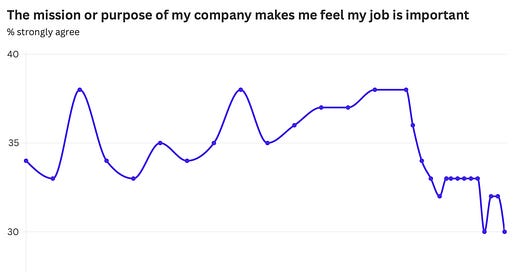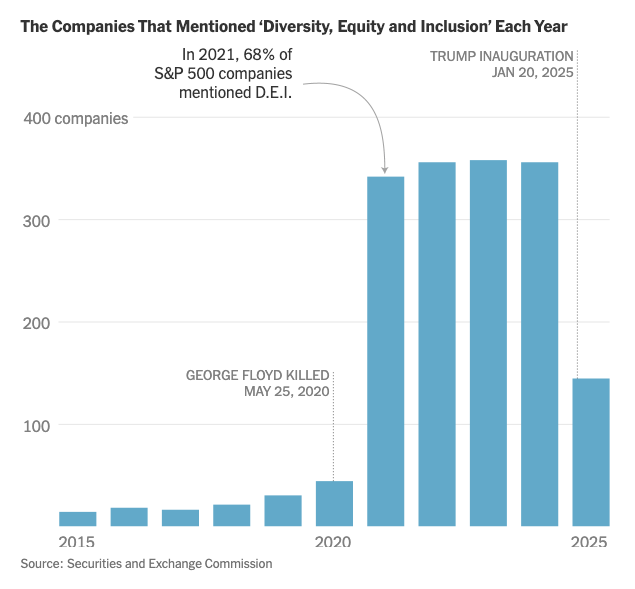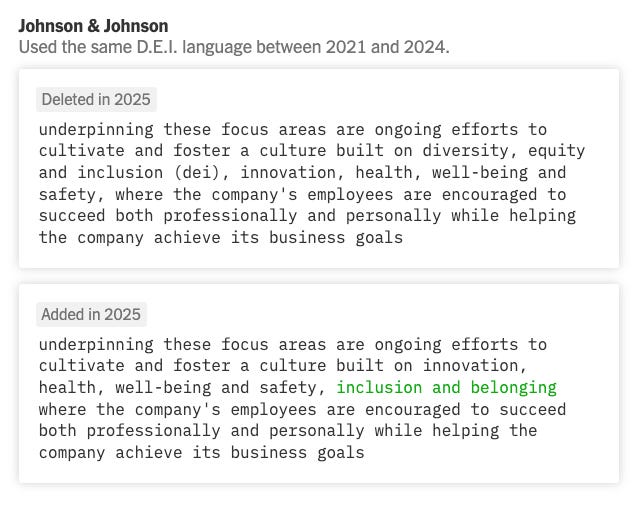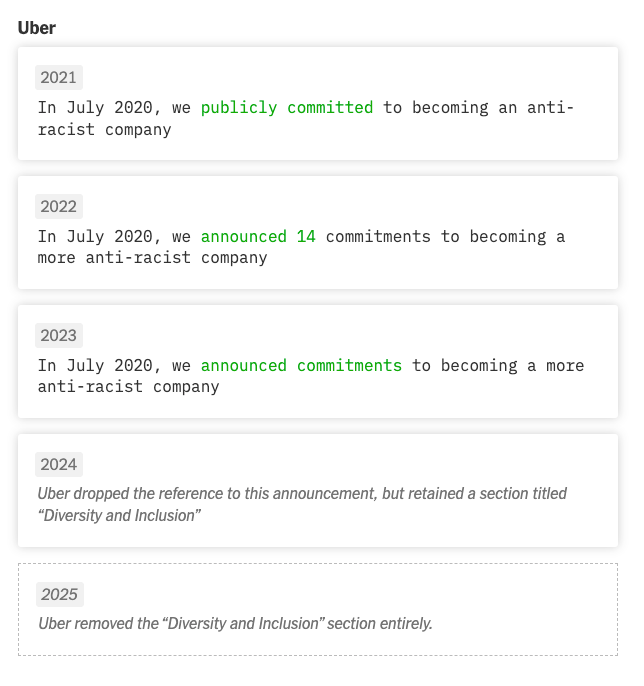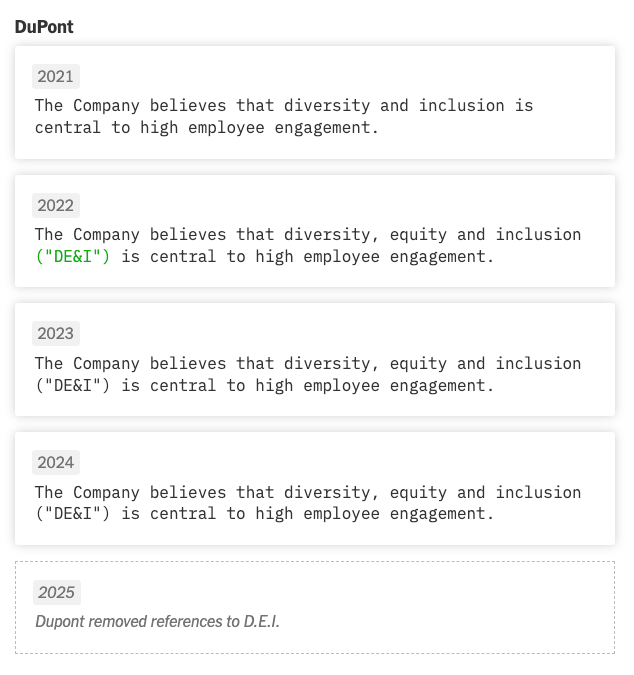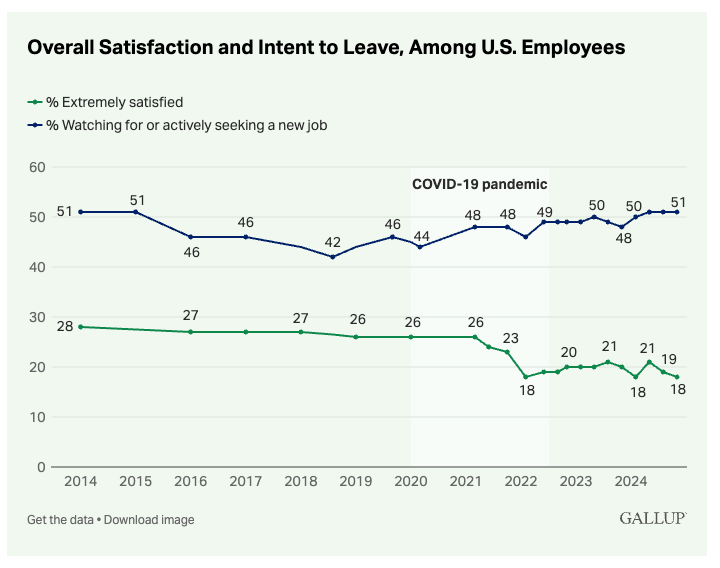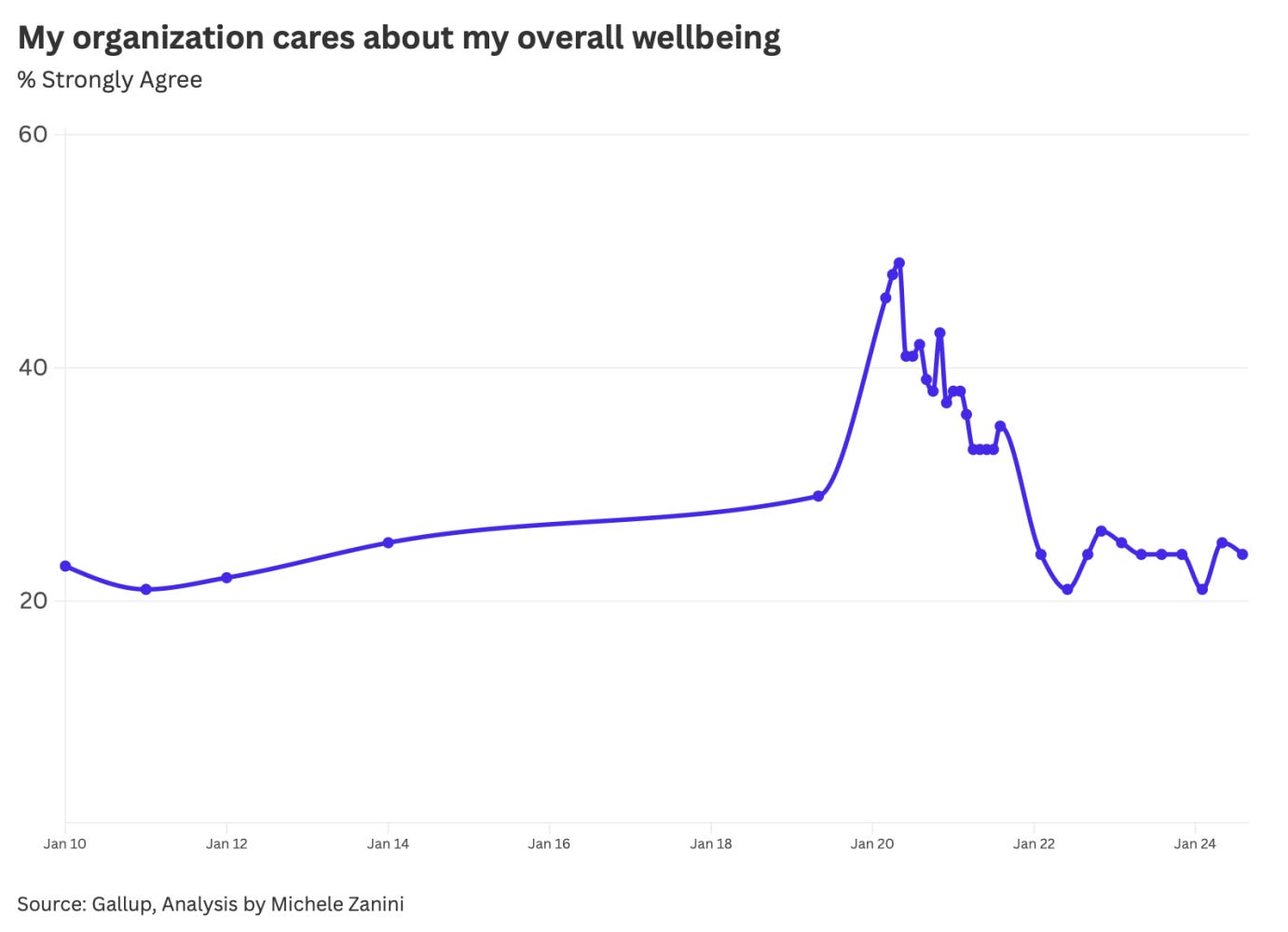The Majority Share
Leo Tolstoy | The Rise and Fall of DEI | Antifragility | The Great Detachment
Wrong does not cease to be wrong because the majority share in it.
| Leo Tolstoy, A Confession
…
One argument in favor of Tolstoy’s maxim is that what the majority believes, or does not believe, can change like the tides or the phases of the moon. The rise and fall of diversity, equity, and inclusion is one such ebb and flow. Another is workers believing their companies give a shit about them.
The Rise and Fall of DEI
I was struck by the visuals in a recent NY Times article about the declining use of DEI-related language in US corporations’ 10-K filings. The bottom line is this:
So far this year the number of companies in the S&P 500 that used the language “diversity, equity and inclusion” in these filings has fallen by nearly 60 percent from 2024.
Seventy-eight percent of companies — 297 out of the 381 that have filed their reports so far this year — continue to discuss various diversity and related initiatives, according to the Times analysis, which examined a decade of financial filings known as 10-Ks that public companies submit each year to the Securities and Exchange Commission.
But many of them have softened or shifted previous language, by removing the word “equity,” for example, or emphasizing “belonging” rather than D.E.I.
Here are a few time-lapsed examples:
One of many co.s to drop the now-radioactive ‘DEI’ acronym, leaving ‘inclusion and belonging’ without the scary — and according to Trump, illegal — ‘equity’.
Some have moved even further, dropping ‘diversity and inclusion’ as well, like Uber.
And DuPont, perhaps the best ‘house of cards’ example in the article, showing the rise and fall of DEI.
‘Belonging’ may survive, however, as Jennifer Miller reported in 2023:
“Belonging is a way to help people who aren’t marginalized feel like they’re part of the conversation,” said Stephanie Creary, assistant professor of management at the Wharton School of Business who studies corporate strategies for diversity and inclusion.
She believes an abstract focus on belonging allows companies to avoid the tough conversations about power — and the resistance those conversations often generate. “The concern is that we are just creating new terms like ‘belonging’ as a way to manage that resistance,” Ms. Creary said.
Ms. Foster contends that as a practical matter, there will be no equity if the people in power — “the straight white male”— feel excluded from the conversation. The people traditional D.E.I. practitioners “most want to enroll are the people they’re isolating and honestly ostracizing,” she said.
The nonpartisan nonprofit Business for America recently interviewed more than two dozen executives at 18 companies and found this to be a common theme. “The way they’ve rolled out D.E.I. has exacerbated divides even while addressing valuable issues,” said Sarah Bonk, BFA’s founder and chief executive. “It has created some hostility, resentment.”
It’s why companies like Woodward are now hiring consultants who specialize in “belonging” and “bridge building.” They are coming to the aid of executives who fear that national divisions are penetrating the workplace, threatening to drive a wedge between colleagues and making everyone feel anxious and defensive.
Today, the wedge has been driven, and ‘the straight white male’ executives can just push the whole DEI mess off their desks into the garbage can… maybe retaining ‘belonging’, if anything.
Antifragility
I enjoyed Build a life that thrives on disorder by Jenni Jang, mostly because of its Taoist feel: the contrasting of absolutes.
Fragile people avoid stress. Robust people handle stress. Antifragile people get better because of stress.
However, I am skeptical of many of her conclusions about antifragility for individuals, like the one above. I think that little good comes from personal stress, and I reject all the sports analogies about ripping muscles during workouts leading to greater personal strength. People are not muscle cells. But organizations are not individuals, either, and systems — like organizations — require stress to evolve.
But Jang’s critical and inspiring:
[Nassim] Taleb repeatedly stresses this idea: fragility is created when decision-makers don’t bear the consequences of their own choices. Politicians who risk nothing personally but gamble with taxpayers’ money. Bankers whose bad decisions get bailed out. Leaders who demand sacrifices but make none themselves.
In personal life, skin in the game means accountability. It means betting on yourself, putting real effort behind your beliefs, and making decisions where you share both the risks and rewards.
Do you take full ownership of your career, relationships, and personal growth? Or do you offload responsibility to external forces? The fragile blame circumstances. The antifragile own their outcomes.
I’m not sure we have to take ‘full ownership’, but I believe acting in an antifragile way makes outcomes better in uncertain times, especially at the organizational level.
Here’s a quote from Taleb that Jang should have included:
You have to avoid debt because debt makes the system more fragile. You have to increase redundancies in some spaces. You have to avoid optimization. That is quite critical for someone who is doing finance to understand because it goes counter to everything you learn in portfolio theory. … I have always been very skeptical of any form of optimization. In the black swan world, optimization isn’t possible. The best you can achieve is a reduction in fragility and greater robustness.
The Great Detachment
Gallup has bad news:
In 2024, U.S. employee engagement reached an 11-year low. Other key measures tell an even gloomier story: Overall employee satisfaction returned to an all-time record low, and employees are seeking new job opportunities at the highest level since 2015.
Apparently, the quit rate hasn’t gone up, so this is ‘The Great Detachment’ while they are looking for new jobs, unlike ‘The Great Resignation’ of 2021.
‘My organization cares about my wellbeing’ has fallen to 25%, below prepandemic levels, and way down from 49% who agreed in 2020:
And people don’t align with the purpose or mission of their company:
Michele Zanini looks at this with a jaundiced eye:
Despite all the talk about "purpose at work" and a flood of manifestos, books, and articles urging its importance, the percentage of people who feel a connection between their company's mission and their job has reached the lowest point since Gallup began to track this metric in 2007.
Zanini also notes that WFH and DEI initiatives have fallen off, but remains hopeful:
A more inspiring future of work isn't going to be handed down, nor emerge naturally due to some inevitable shift. It's something we'll need to create ourselves with intention, perseverance, and concerted action. To get the workplaces we deserve, we need to stop moaning and start mobilizing.
Ok, ok. But I wonder who is the ‘we’ he is talking about.
In my case, I think ‘we’ (everybody not a manager) can’t wait for more enlightened management to show up or grow up.
We Need A New Work Culture
The discourse about a more enlightened future of work that hinges on the enlightenment of business owners and managers is basically a surrender, like handing over your wallet to a thief and asking him to please, at least, give back your driver’s license.
Keep reading with a 7-day free trial
Subscribe to Work Futures to keep reading this post and get 7 days of free access to the full post archives.

